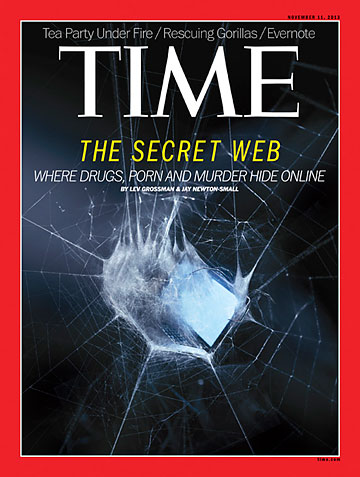
(3 of 8)
The corruption of the Deep Web began not long after it was built. As early as 2006, a website that came to be known as The Farmer's Market was selling everything from marijuana to ketamine. It built up a clientele in 50 states and 34 countries before a DEA-led team brought it down in April 2012. The Deep Web isn't just a source for drugs: there is evidence that jihadists communicate through it and that botnets--massive networks of virus-infected computers employed by spammers--use it to hide from investigators. Even now, it's the work of a minute or two to find weapons or child pornography on the Deep Web. In August, the FBI took down Freedom Hosting, a company specializing in Deep Web sites, alleging that it was "the largest facilitator of child porn on the planet." Its owner, a 28-year-old named Eric Marques, is facing extradition from Ireland.
But Silk Road was different. For one thing, it was more discriminating: its terms of service forbade child pornography, stolen goods and counterfeit currency. For another, it didn't use dollars; it used bitcoins.
When Bitcoin appeared in 2009 it was a radically new kind of currency. It was introduced as a kind of fiscal thought experiment by someone known only as Satoshi Nakamoto, whose true identity is still a mystery. Bitcoin is both a payment system and a currency that is purely digital--it has no physical form. A bitcoin's worth is determined by supply and demand and is valuable only insofar as individuals and companies have agreed to trade it.
Bitcoins belong to an era in which trust in banks and government has been compromised. Users can transfer them from one digital wallet to another without banks brokering the transaction or imposing fees. The currency is completely decentralized--its architecture owes a lot to Napster's successor, BitTorrent--and is based on sophisticated cryptography. Bitcoin is essentially cash for the Internet, virtually anonymous and extremely difficult to counterfeit. The Farmer's Market was vulnerable because it left financial tracks in the real world. Silk Road didn't.
Like Tor, Bitcoin has entirely legitimate reasons for existing. As far as anyone can tell, it's primarily used for legal purposes--scores of businesses accept bitcoins now, including Howard Johnson, the dating website OKCupid and at least one New York City bar. But Bitcoin's digital slipperiness, when force-multiplied by the anonymity of the Deep Web, creates a potential platform for criminal transactions unlike anything the real or virtual world has ever seen. That potential was realized by the Dread Pirate Roberts.
JOHN GALT 2.0
Ross Ulbricht grew up in Texas, an Eagle Scout who went on to study physics at the University of Texas in Dallas. He was a fan of fellow Texan and libertarian Ron Paul; both studied the Austrian school of economics and the work of its father, Ludwig von Mises, who believed in unrestricted markets. Ulbricht earned a master's in materials science and engineering at Pennsylvania State University. Acquaintances describe him as bright and straitlaced. "He wasn't the center of conversation or the center of anything," says a friend who claims to have briefly dated him last year. "He kind of set himself in the background."
